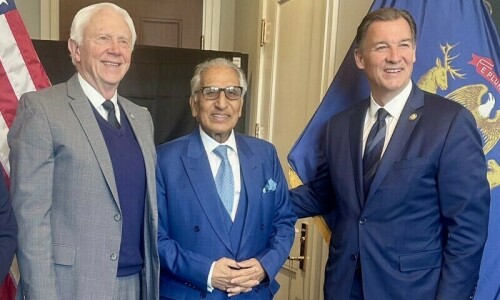• Two-judge bench declares indictment of Imran Khan, Shah Mehmood Qureshi ‘void’
• Law ministry’s notifications, cabinet’s approval of jail trial also struck down
• Court upholds appointment of ATC judge Zulqarnain
ISLAMABAD: The Islamabad High Court (IHC) on Tuesday declared illegal the proceedings of the cipher case against former prime minister Imran Khan and foreign minister Shah Mehmood Qureshi, meaning that the entire process will have to start afresh.
The short order, issued by a two-member IHC division bench comprising Justice Miangul Hassan Aurangzeb and Justice Saman Rafat Imtiaz, said the jail trial had “vitiated” the entire proceedings in the case.
The verdict was announced on the intra-court appeal, filed by Mr Khan, in which he had challenged the decision of a single-member IHC bench approving his jail trial in the case.
While declaring the proceedings void, the bench said notifications issued for conducting the trial in jail were against the law and spoiled the proceedings, including the indictment of Mr Khan and Mr Qureshi and the testimonies of four witnesses.
The court, however, validated the appointment of ATC Judge Abual Hasnat Zulqarnain as Special Court (Official Secrets Act) Presiding Officer.
As a result of the judgement, the Special Court — formed to prosecute Mr Khan and other accused — would start a fresh trial.
Sources privy to the matter told Dawn that if a new trial is commenced, the prosecution would have to file a fresh application to conduct the trial in jail.
In case such an application is accepted, the trial would resume within jail premises, according to legal experts.
The prosecution would also have to submit a fresh challenge for the re-indictment of Mr Khan and Mr Qureshi.
Since the witnesses’ testimonies recorded so far have also been rendered void, they will also need to be summoned again, experts believed.
Notifications ‘illegal and void’
In its order, the bench said the law ministry’s notification of August 29 to conduct the trial in jail was “without lawful authority” and had “no legal effect”.
The requirements — to conduct the trial in jail — provided in Section 352 of the Criminal Procedure Code and Rule 3 in Part-A of Chapter-1 in Volume-III of the Rules and Orders of the Lahore High Court were not met, the order reasoned.
The rule in question states: “The place where a criminal court is held shall be deemed an open court to which the public generally may have access so far as the same can conveniently contain them,” but the discretion to exclude the public from the ordinary courtroom rests with the presiding magistrate. When, however, the presiding magistrate, for any reason, excludes the public by holding his Court in a building such as a jail, to which the public is not admitted (and he is not entitled to do so without permission of the Department concerned) he should obtain the sanction of Government thereto, through the District Magistrate, and should inform the High Court that sanction has been accorded.“
In its August notification, the ministry cited “security concerns” to justify the trial in Attock jail. Later, proceedings continued at Adiala Jail in Rawalpindi when Mr Khan was relocated there following a court order.
The subsequent notifications for the jail trial issued on September 25 and October 13 were also declared void, for the same reasons.
Moreover, the court found that the notifications issued on November 13 and 15, following the federal cabinet’s approval of the jail trial, were also “of no legal consequence.”
The federal cabinet’s decision had a retrospective effect, which was “erroneous”.
“Consequently, the proceeding with effect from August 29, 2023, and the trial conducted … in jail premises in a manner that cannot be termed an open trial stand vitiated,” the bench noted.
Meanwhile, the law ministry’s June 27 notification of Judge Zulqarnain’s appointment was upheld.
‘Security concerns’
Counsel for both sides concluded their arguments before the court announced its reserved verdict at around 5:30pm.
During arguments, Mr Khan’s counsel Salman Akram Raja, contended that the judge had virtually conducted an in-camera trial in the jail over “so-called security concerns”.
He argued that security concerns should be based on some material available on record.
According to him, the request to designate jail premises as a court had to be routed through the chief commissioner concerned.
He also questioned the retrospective nature of the federal cabinet’s approval of the trial on Nov 15.
The “cabinet cannot give retrospective approval. It could have granted consent but with prospective effect,” he argued.
Attorney General Mansoor Usman Awan argued that the trial court judge was aware of the security concerns pointed out by Mr Raja.
During the arguments, Mr Khan’s counsel also objected to the appointment of Judge Zulqarnain as special court judge.
He stated that consultation with the Supreme Court chief justice was required for such an appointment.
Mr Raja then requested the court declare the trial court proceedings illegal and sought an order for an open-court trial.
The lawyer pointed out several “anomalies” in the proceedings and added that the indictment of the accused “was also not done properly”.
Moreover, the cipher — the key evidence in the case — and other documents were not shared with the defence counsel, he added.
Published in Dawn, November 22nd, 2023













































